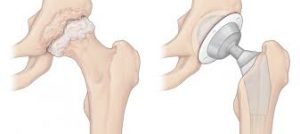
An Orthopedic surgeon specializes in the treatment of a variety of conditions that affect the musculoskeletal system. They treat problems of bones, joints, muscle, nerves, and other parts of the musculoskeletal system. There are a number of sub-specialties within the field of orthopedic surgery one of which includes hip surgery.
When do you need Orthopedic Surgeries ?
Orthopedic surgeries are practiced to fix a number of concerns with the bones, muscles, and ligaments. Educate yourself about your upcoming procedure and recovery time so you know what to expect.
When do you require Hip Surgery?
Hip surgeries are the second most common surgical procedure, closely after knee replacements. However, there is a little bit of confusion about what to expect from hip surgeries.
Hip surgery is performed when the hip joint has reached a point when painful symptoms can no longer be controlled with non-operative treatments. In hip surgery, the surgeon removes the damaged joint surface and replaces it with an artificial implant.
A total hip replacement is a major surgery, and deciding to have the surgery done is a big decision. You have to consider whether you’re too young for a hip replacement and you’re likely to need to have it redone. But there can be consequences in delaying joint replacement surgery. As well, older age is a concern and maybe an exclusion factor for a hip replacement.
While performing a hip surgery, the bone, and cartilage on the ball-and-socket hip joint removal occur. Usually, utilizing proper and correct instruments that can carry or perform the implant properly, results in completing the surgery. The artificial hip replacement implant then is placed to function further as a new hip joint.
Also, Hip surgeries have become quite prevalent, but there are still risks. Fortunately, about 90 percent of patients who undergo hip replacement surgery have good results.

You should have a thoughtful discussion with your doctor prior to hip replacement surgery and make sure to have your questions answered.
Potential risks of hip replacement surgery
- Blood clots
- Blood loss
- Infection of a joint replacement
- Hip dislocation
- Leg length difference
- Hip implant loosening
It is important to understand the possible risks of surgery for a variety of reasons. By understanding what could possibly go wrong, you can keep an eye out for signs and symptoms of a complication of hip replacement surgery. Often, if these problems are identified early, steps can be taken to prevent them from becoming more severe.
How long does it take to recover from a hip replacement surgery?
Most specialists aspire that their patients up and about on the day of operation. You may start physical therapy on the earliest day after surgery. You can anticipate the recovery to take from 4 weeks to 6 weeks. In many circumstances, it can take as long as six months.
If you are in inadequate physical condition or obese, recovery is more prolonged.
Since many people who get hip replacements remain idle due to the hip pain, they may find it more challenging with more delay in healing due to poor muscle tone. Also, people who don’t take their physical therapy sincerely will take extended time to heal.
